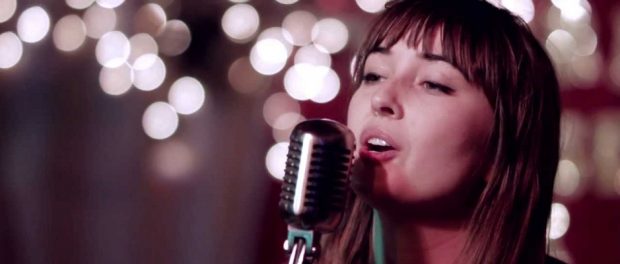Jess Williamson – Manchester Gullivers

Jess Williamson sits, checks the tuning of her guitar, takes a sip of her wine, and begins to sing. ‘Say It’, her stinging opener, is a blackened thing in its recorded form: a grave and unflinching examination of a relationship in crisis. The first track on her recently released second album Heart Song, it’s both statement of intent and warning to the curious: it’s dark in here. Tonight, stripped of its teetering shuffle and of its keening electric guitar, it both reduces and expands. “Don’t get too comfortable,” breathes Williamson. “My mixed up mind has a list of victims.” In the backroom of a Manchester pub, where the clued-up have assembled in number for the final night of this tour, the stakes are high and the atmosphere charged.
Tonight is a first for the Austin, Texas native. Her electric guitar is having problems (“I think it’s haunted”), so she plays support act Jo Rose’s acoustic instead. She speaks fondly of her band – “It’s just so expensive to bring them over”, she says afterwards – but relishes the prospect of exploring her songs in new ways. Those songs duly flourish when exposed. At first, they appear to sprawl. They’re often long and they drift as though untethered and free, but there’s more to their wiry architecture than a simple free-form aesthetic. The likes of ‘Snake Song’ eschew sweet melodics in favour of something altogether more challenging: space, texture, room for Williamson to frame her rich and compelling dialogues. Her words, deeply poetic and housing a forensic unpicking of relationships and a series of unflinching self-assessments, need little to give them life, but tonight, as she shifts from a barely-there whisper to the upper range of her bright contralto, they embed themselves in the listener.
In a set constructed largely from Heart Song, she diverts for a cover of Jackson C. Frank’s ‘Blues Run the Game’, a song reworked so routinely and so often, the original feels almost tainted. But Williamson heads straight for its dark heart. Even the likes of Nick Drake and Laura Marling allow for much of its original spring, but here, it becomes a sombre meditation on the dull pain of resignation. “When I’m not sleeping, you know you’ll find me crying,” she broods, and finds new and alarming currency in a song you thought you’d tired of long ago.
But it is her own recent work that most vividly showcases her broadening talent. During an intense reading of ‘White Bed’, voice and guitar seem almost in opposition, build their own drama. Reference points are of little use: Williamson’s voice and vision are startling and unique. And while comparisons with current purveyors of similar legacy materials are perhaps halfway there, when she sings of a love that “hits me like streets gone suddenly quiet” and the voice crackles, it’s pioneers from the previous generation that are of more use – early Throwing Muses (Kristin Hersh facing down unfathomable demons on ‘Delicate Cutters’), the stark howl of Mary Margaret O’Hara’s (inexplicably forgotten) Miss America.
‘Blood Song’, from her 2014 debut Native State, is overpowering: “I can’t be enough when we are not in love,” she sings and the bleakest punchline (“That’s what I call fucking timing…”) lifts you off your feet. Every time. Heart Song’s epic centrepiece, ‘See You In a Dream’, transports. From a distance, it has a foot in the regular: the rise and fall of its verse and a hint of classic Orbison. When Williamson sings of “the bars and bedrooms with the pain / I know them all by name” it becomes extraordinary and resonates powerfully with the song’s backstory (a friend who ignored the singer for years but who would visit her regularly in her dreams.) The real story, however, is in what comes as a result. “Is our story the same?” are the last words Williamson sings tonight and for a moment she alights on something: something – as far as her songbook’s pained questioning, doubt and (at times) self-loathing will allow – close to clarity, or even peace.
